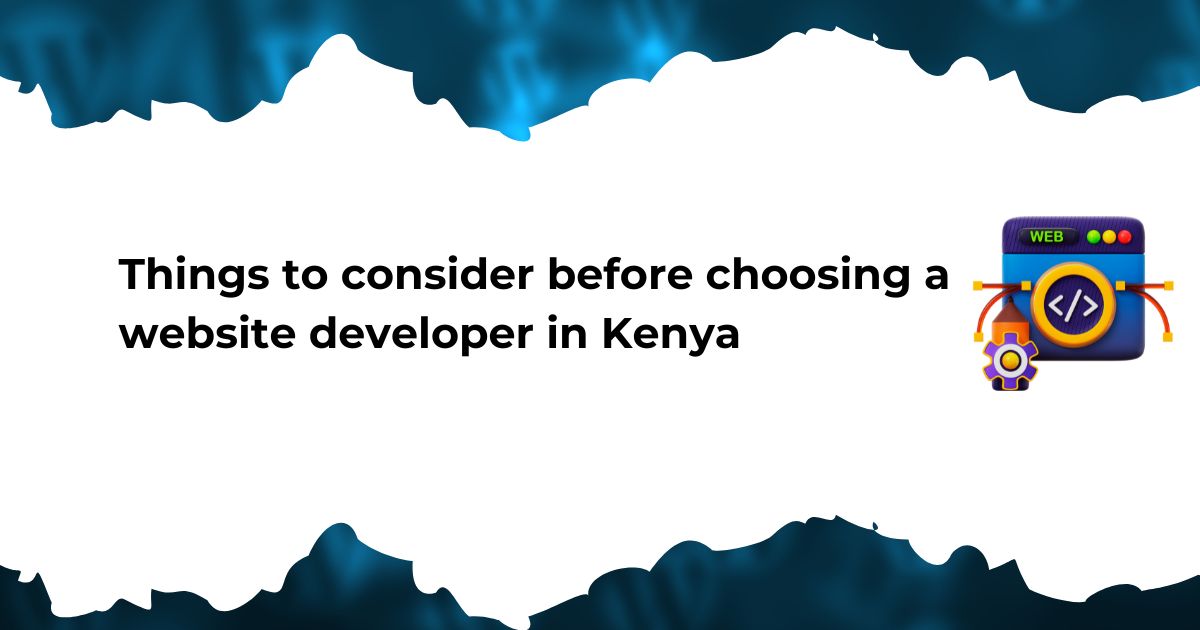Are you looking to elevate your online business presence in a vibrant market like Kenya? With the rapid growth of eCommerce, having an expertly crafted website is more crucial than ever. In this digital age, consumers expect seamless shopping experiences and engaging interfaces that reflect their preferences. This article dives into the world of Ecommerce website developers in Kenya, highlighting their innovative solutions and unique approaches that can help businesses thrive in a competitive landscape. Whether you’re a budding entrepreneur or an established brand seeking to enhance your online footprint, you’ll discover how these talented developers are transforming ideas into successful eCommerce platforms tailored for success.
Overview Of The E-commerce Landscape In Kenya
As the sun rises over Nairobi, illuminating the bustling streets filled with vendors and vibrant markets, it’s clear that Kenya is embracing a new era of commerce—one where e-commerce website developers in Kenya are playing a pivotal role. With an ever-growing demand for online shopping experiences, businesses are increasingly investing in ecommerce websites in Kenya to reach broader audiences.
This shift isn’t just about convenience; it’s transforming how we shop and interact with brands. Consequently, effective ecommerce web design has become essential for companies wishing to stand out amidst fierce competition. Moreover, as more Kenyans gain access to the internet and smartphones, the landscape continues to evolve rapidly. Therefore, understanding the key skills and technologies that these innovative developers employ becomes crucial for anyone looking to thrive in this digital marketplace.
Key Skills And Technologies Used By E-commerce Developers
When it comes to crafting captivating e-commerce experiences, developers in Kenya harness a host of crucial skills and cutting-edge technologies. First off, programming prowess is paramount; languages like PHP, JavaScript, and Python are frequently employed to build robust platforms that can handle high traffic efficiently. Additionally, familiarity with frameworks such as Laravel or Django enhances their ability to create dynamic websites tailored for user engagement. Moreover, understanding database management through SQL or NoSQL systems ensures seamless data handling, which is vital for an online store’s success. To top it all off, knowledge of payment gateways and security protocols keeps customers confident in their transactions. All these elements come together to form a solid foundation for thriving e-commerce ventures. As we delve further into this vibrant industry, let’s explore the leading e-commerce development companies in Kenya making waves today.
Top E-commerce Development Companies In Kenya
When it comes to e-commerce development in Kenya, the industry is like a bustling marketplace filled with innovative minds and cutting-edge technologies. There are several top-notch companies that stand out, each bringing their unique flair to online retail solutions. For instance, firms like Mick Web Agency and Web Tribe have carved a niche for themselves by offering tailored services that cater to both local businesses and international brands. Moreover, you can’t overlook companies such as Craft Silicon and Dotsavvy; they’ve gained recognition for their robust platforms that seamlessly blend functionality with user experience. As you explore these options, you’ll find they not only develop websites but also provide essential support through digital marketing strategies, ensuring your e-commerce venture thrives in today’s competitive landscape. With so many talented developers at your fingertips, the potential for growth is virtually limitless.
Frequently Asked Questions
What Is The Typical Timeline For Developing An E-commerce Website In Kenya?
When it comes to developing an e-commerce website in Kenya, the typical timeline can vary significantly based on several factors. Generally speaking, you might expect the process to take anywhere from a few weeks to several months. Initially, there’s the planning phase, which usually lasts about 2-4 weeks; during this time, developers and clients collaborate to define goals and requirements. Following that, the design phase kicks in, often taking another 2-6 weeks as designers create user-friendly interfaces tailored for your target audience. Once that’s settled, development starts and could span 4-12 weeks or more depending on complexity—this is where all those features you’ve envisioned come together. Lastly, testing and deployment may require another couple of weeks to ensure everything runs smoothly before launching your site.
TIP: To streamline your project timeline, consider having all your content ready beforehand—such as product descriptions and images—and communicate clearly with your developer about any specific functionalities you need!
This Question Addresses The Duration Of The Website Development Process, Which Can Vary Based On Project Complexity, But Is Often Overlooked In General Discussions Of E-commerce Development.
When you think about launching an e-commerce website, it’s easy to envision the final product—a sleek online storefront brimming with products and ready for customers. However, behind that polished façade lies a development process that can often feel like navigating through a dense fog, obscured by various factors. The duration of this journey varies significantly based on project complexity; what might seem straightforward at first glance could transform into a maze of requirements and adjustments as developers dive deeper. For instance, while some projects may take just a few weeks, others could stretch across several months or even longer.
To better illustrate how these complexities affect timelines, consider the following key points:
- Project Scope: The breadth and depth of features desired can greatly influence development time.
- Customization Needs: Highly tailored solutions require more extensive coding and testing phases.
- Feedback Loops: Iterative feedback from stakeholders can slow down progress but is crucial for achieving alignment with business goals.
Understanding these aspects helps set realistic expectations when embarking on your e-commerce venture. Each step in the process contributes to building not only a functional website but also one that resonates well with users and stands out in the competitive digital marketplace. Embracing this timeline means you’re investing not just in technology but in creating an engaging experience for potential customers.
Conclusion
As we journey through Kenya’s vibrant e-commerce landscape, it’s clear that skilled developers are the architects of our digital marketplace. Just as a gardener cultivates diverse blooms, these creators nurture online businesses to flourish. By embracing innovation and collaboration, we’re not just building websites; we’re cultivating economic growth for all.




